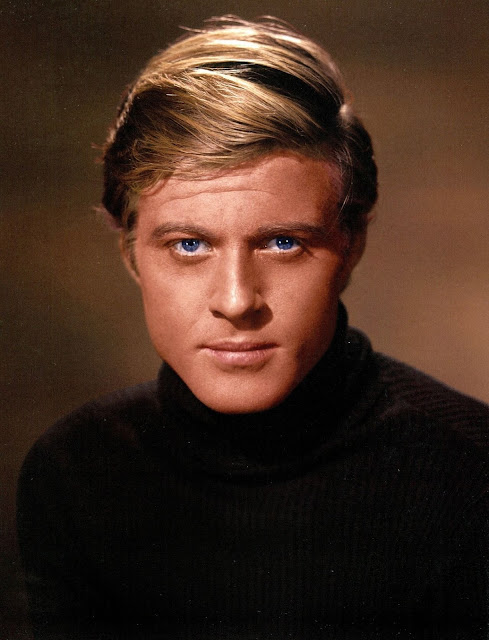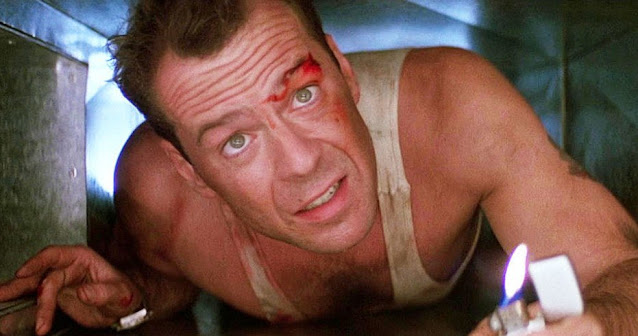The Unlikely Casting of Dustin Hoffman in "The Graduate"
Director Mike Nichols had a great deal of difficulty casting the part of ‘Benjamin Braddock’ in The Graduate.
 |
| Dustin Hoffman as 'Benjamin Braddock' and Katharine Ross as 'Elaine Robinson' in The Graduate |
When he and Buck Henry were working on the script, Nichols had envisioned Robert Redford in the role, but after a screen test, he realized that Redford could never convincingly play a loser in love. “So we tested and tested and tested people and read and read and read people, hundreds of people,” said Nichols. Producer Larry Turman recalled, “We were looking for someone who was sweet and goony. Sweet because he had to do some weird things, and goony because to do those weird things, he couldn’t be too self-assured.”
 |
| Robert Redford in 1966 |
In the meantime, Nichols met Katharine Ross and was instantly smitten. “She came in to see me, and I said, ‘That’s it. We don’t have to look any further. She’s so beautiful, she’s beautiful in that girl-of-your-lifetime way.’ I loved her.”
 |
| Katharine Ross in 1967 |
Then, one month after the talent search began, Nichols found his ‘Benjamin.’ “I remembered this guy that I saw in a play called Harry, Noon and Night in which he played, believe it or not, a transvestite German fishwife,” Nichols said. “He was remarkable and very funny. So I said, ‘Let’s test him.’”
 |
| Dustin Hoffman in Harry, Noon and Night in 1965 |
Nichols tracked down Hoffman in the midst of an acclaimed run in the British play Eh? at NY’s Circle on the Square. When Nichols offered to buy him a drink and then invited him to screen test in Los Angeles, Hoffman was instantly miserable. “This is not the part for me,” Hoffman thought. “I’m not supposed to be in movies. An ethnic actor is supposed to be in ethnic New York in an ethnic off-Broadway show. I know my place.”
Despite his better judgment, Hoffman flew out to Hollywood to screen test for The Graduate. “I was doing eight shows a week, and was pretty tired to start with,” Hoffman recalled. “When I got to the studio, after a quick jet from New York, I was so nervous and fatigued I couldn’t concentrate.”
When Hoffman was introduced to Katharine Ross, he felt even worse. “The idea that the director was connecting me with someone as beautiful as her became an even uglier joke,” he revealed. “It was like a Jewish nightmare.” Hoffman was put into a makeup chair and subjected to a two-hour overhaul, after which Nichols told the makeup department to do something about his unibrow. Then Nichols asked, “What are we going to do about his nose?” Hoffman called it “one of the most demeaning experiences I’ve ever had.”
For the screen test, Hoffman found himself sitting on a bed playing a love scene with Katharine Ross. “I’d never asked a girl in acting class to do a love scene,” he admitted. “No girl asked me, either.” He said he was thinking, “A girl like that would never go for a guy like me in a million years.”
Ross was also dubious at the time, thinking, “He looks about three feet tall, so dead serious, so humorless, so unkempt. This is going to be a disaster.” At one point in the screen test, Hoffman felt so hopeless and desperate that he resorted to grabbing Ross’s ass, at which point she told him to keep his hands to himself. “I blew lines repeatedly, and did a terrible job, and knew I wouldn’t get the part,” said Hoffman.
But the next day, when Mike Nichols viewed the test, he was surprised and elated. “We’re in business,” he told Hoffman. “You came up with just the kind of confused panic the character’s supposed to have.”
Hoffman recalled, “Nichols said that when he looked at the screen test, that I was so panicked – it was a long, hard day, because we had to do like a ten page scene without a cut and moving around and a camera on a crane, and by the time we finished, we were rags – that the panic that I had doing the screen test is what he wanted.”
Nichols said the screen test was better than he could ever have expected. “He was very good in making the test, but he was 25% better the next day on film. I had experienced that but once before, with Elizabeth Taylor. They always said that she had a deal with Technicolor – that she got 25% better in the processing bath overnight at Technicolor. And Dustin did, too. I said, ‘Oh look, he’s a movie actor.’”
Screenwriter Buck Henry could see the magic, too. “In Dustin’s screen test, the soul was there,” he said. “You could see it. He just wiped everyone else out.”
Nichols said, “I felt having Dustin in the part was organic and it was right. I didn’t think about the movie coming out, much less being a smash. I was just thinking, ‘How could I best serve this story?’ And I needed somebody unusual.” Nichols, who deeply identified with the character, felt that casting the right actor meant more than finding the right look. “I kept looking and looking for an actor until I found Dustin, who’s a dark, Jewish, anomalous presence – which is how I experience myself. So I stuck this dark presence into Beverly Hills, and there he felt that he was drowning in things, which was very much my take on the story… I was a blond, green-eyed person, but I could never see myself that way. I identified with the dark outcasts.”
Decades later, Dustin Hoffman acknowleged the leap of faith his director took in choosing him. “You have to tribute Nichols for casting me, because he was hearing an inner voice rather than just, you know, product,” he said. “I always felt that I had been miscast. I expected to be fired, so the discomfort I felt was not just being new to movies. The discomfort was feeling that they’d made a mistake casting me.”
During filming, Life magazine visited the set and cruelly validated Hoffman’s self-loathing. “If Dustin Hoffman’s face were his fortune, he’d be committed to a life of poverty,” Life said. “With a schnoz that looks like a directional signal, skittish black-beady eyes and a raggedy hair-cap, he stands a slight 5’ 6”, weighs a mere 134 pounds and slouches like a puppet dangling from string. All in all, he resembles a swarthy Pinocchio.”
Dustin Hoffman later revealed that he wasn’t the only person on the film who wondered why someone like him was playing the lead role in a major motion picture. “They felt ambivalent all the way through shooting, and even into the previews,” said Hoffman. “People would come up to the producer and say, ‘You’d have a hell of a movie if you hadn’t miscast the lead.’”
David Zeitlin, “A Homely Non-Hero, Dustin Hoffman, Gets an Unlikely Role in Mike Nichols’ The Graduate,” Life, 11/24/67
The Graduate Press Release, Avco Embassy Pictures Corp., 1967
“Grudging Graduate,” People, 11/2/92
Jamie Diamond, “A Story His Father Might Have Told,” New York Times, 9/1/96
“Henry Worked on Many Hits,” NPR’s Fresh Air, 2/24/97
Gavin Smith, “Mike Nichols,” Film Comment, 5/1/99
“Dustin Hoffman Discusses His Acting Career,” NPR’s Talk of the Nation, 12/4/03
Mahnola Dargis, “Dustin Hoffman Stops Trying So Hard,” New York Times, 4/17/05




Comments